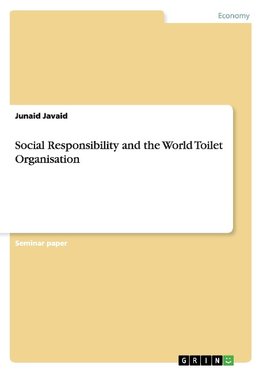
-
 Anglický jazyk
Anglický jazyk
Social Responsibility and the World Toilet Organisation
Autor: Junaid Javaid
Seminar paper from the year 2013 in the subject Business economics - Business Management, Corporate Governance, grade: B, University of Bedfordshire, course: MSc International Business Management, language: English, abstract: The scope of this report is... Viac o knihe
Na objednávku, dodanie 2-4 týždne
25.92 €
bežná cena: 28.80 €
O knihe
Seminar paper from the year 2013 in the subject Business economics - Business Management, Corporate Governance, grade: B, University of Bedfordshire, course: MSc International Business Management, language: English, abstract: The scope of this report is broad as it deals with implication of social responsibility in regard to the success of company. In relation to the Scale of Problems faced by World Toilet Organisation, it has been understood there is a huge underlying demand for the affordable solution as there are almost 2.6 billion people who does have access to proper sanitation and thus signifies that there is a desperate need for about one billion affordable toilets and hence rendering it as a significant work stream in the given context. The organisation only needed venture capital investment by 2015 and after that it would aim for massive scale. In accordance with model of self interest it has been outlined that Jack Sim (founder of World Toilet Organisation) oriented WTO as the advocacy organisation with the purpose of enhancing awareness of huge gap existing between the industrialised and emerging economies in the respective area. Correspondingly, WTO has started to involve heavily in the sanitation marketing and this have been made possible through SaniShop program (The World Economic Forum Water Initiative, 2011). It has been believed that in this way, WTO's activities of business development can be tied up with the traditional communications, training activities and advocacy which has enhanced the organisation's competence up to great extend throughout the whole decade operations. From the case study of Cadbury Schweppes, it has been discovered that the Community Investment Programme (CIP) is strategically helping the company to focus more on the resources where they could add value. Corresponding, in case of Grameen Group, With respect to TATA Group, the social activities have permitted the company to become most respected company in the history of Indian corporate sector. However, ASDA is able to clinch the success in the very short period as compare to its competitors and it is only possible through the social responsibility activities implicated by the company. And finally in reference to Toyota, the company's strives toward promoting environmental and educational projected have directed the company towards the way of making its production processes more efficient and also have enhanced company's reputation.
- Vydavateľstvo: GRIN Verlag
- Rok vydania: 2014
- Formát: Paperback
- Rozmer: 210 x 148 mm
- Jazyk: Anglický jazyk
- ISBN: 9783656818021











